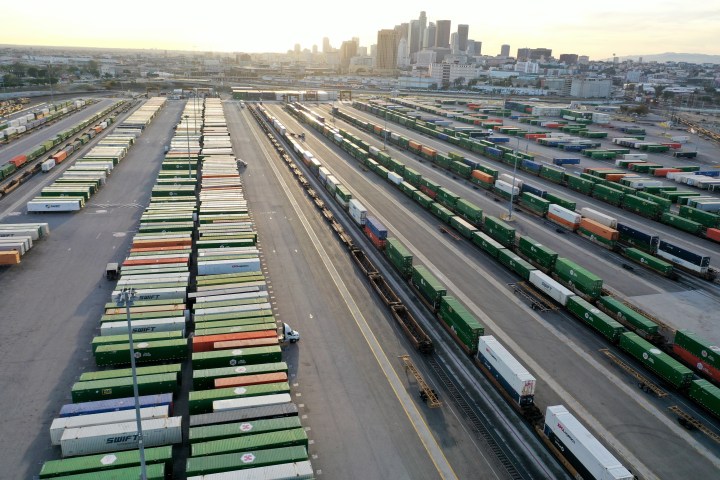
Deadline looms for potentially “perilous” nationwide rail strike
Deadline looms for potentially “perilous” nationwide rail strike

For the first time since 1992, the United States may be staring down the barrel of a national railroad strike. Essential sectors of the economy, including energy, agriculture and even producers of chemicals to treat sewage water, depend on rail transport to get their goods into customers’ hands.
After months of negotiations between labor unions and rail companies, the Joe Biden administration brokered a proposed contract in September, trying to avert a work stoppage. But the majority of workers voted against the new contract, putting a strike back on the table.
More than 400 groups, including the National Association of Manufacturers, the National Retail Federation, the American Petroleum Institute and the National Restaurant Association, have called on Congress to do what it takes to head off an event that could paralyze much of the nation’s commerce.
Rachel Premack, editorial director at FreightWaves, joined Marketplace’s Kai Ryssdal to talk about a strike’s implications for the economy.
The following is an edited transcript of their conversation.
Kai Ryssdal: What do you make of the fact that these negotiations have been going on for almost three years now? There was a deal, and now there’s not a deal.
Rachel Premack: Yeah. So these rail workers are demanding, not so much higher pay, but more vacation time or opportunity to take sick leave. And that’s really not something that the rail companies at this point are willing to budge on.
Ryssdal: What’s been going on in railroads the last number of years that it came to this kind of labor situation, where these engineers and drivers and everybody can’t get time to go see the doctor?
Premack: Rail companies have been pushed to get those better profit margins, better performance on Wall Street, and as a result, they’re trying to use as little equipment and staff as possible to manage the same or even more amount of carloads. But it really came to a head during the lockdowns in early 2020. We saw those railroad companies lay off considerably more workers trying to keep profitable and keep operating. And, as a result of that, when freight volumes started to pick back up again, they were caught really flat-footed. So they had almost the same amount of carloads as they would have in typical times, but far fewer staff.
Ryssdal: So here we are now with, give or take, depending on the labor organizing unit that you’re paying attention to and what their strike deadlines are, we’ve got a week, 10 days-ish, until things could go south. What does it look like if the railroad system fundamentally goes on strike?
Premack: Let’s say we have a strike of one to three days. A lot of chemical companies, fertilizers, coal, energy, these sorts of industries that really do depend on rail, they’ll be prepared. They’ll have extra breathing room to make sure that, you know, the lights don’t go out or that wastewater processing plants can still provide clean drinking water. But if we see a strike that lasts for weeks or longer than that, that could be pretty perilous to society at large, actually.
Ryssdal: There are those who are gonna say, “Well, can we just put it all on trucks?” I mean, trucks are a huge part of the logistics infrastructure in this economy. Can’t we just do that?
Premack: Well, unfortunately, no. The trucking industry doesn’t have enough capacity to move everything that’s moved by rail on truck. That would also really be quite disastrous for inflation because moving commodities by rail is much cheaper than moving it by truck.
Ryssdal: So we’ve had three years of negotiation, we’ve had arbitration, we’ve had the White House and a presidential emergency board, the secretary of labor has been involved. And here we are, a week away. Now what happens?
Premack: Well, we still have a cooling-off period until Dec. 9 at 12:01 a.m. There’s one smaller union that could potentially strike as soon as Dec. 5, but Dec. 8, Dec. 9, those are really the dates that I’m watching closely to see what happens next.
Ryssdal: There is also the possibility that Congress could get involved, right? But I don’t need to point out that Congress has a tough time agreeing on almost anything without a great deal of pain these days.
Premack: Absolutely. So Congress can intervene to impose an agreement if these two sides remain deadlocked, but it’s uncertain whether that would actually happen. We do still have a Democratic majority in Congress, so the likelihood of them making the sort of pro-business, perhaps antilabor type of move, that doesn’t seem quite likely. On the other hand, if the country is at a standstill, in my opinion, there’s no choice but to make some sort of agreement if this is going on for weeks and weeks.
Ryssdal: You are the subject matter expert in this conversation. Spitball it for me. What do you think’s gonna happen?
Premack: I would say it’s likely we will see a one- to three-day strike. That’s what the experts are telling me. That is my most likely guess. The last time we did see a strike was in the early ’90s. It was also a matter of a few days of a strike. But even a small strike like that is incredibly disruptive to the whole nation.
There’s a lot happening in the world. Through it all, Marketplace is here for you.
You rely on Marketplace to break down the world’s events and tell you how it affects you in a fact-based, approachable way. We rely on your financial support to keep making that possible.
Your donation today powers the independent journalism that you rely on. For just $5/month, you can help sustain Marketplace so we can keep reporting on the things that matter to you.











